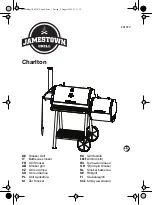
2
NOTE:
Smoke detectors are not to be used with
detector guards unless the combination has been
evaluated and found suitable for that purpose.
Pick smoke
-
detector location.
Referring to the
NFPA standard on page 3, select a suitable loca-
tion to mount the detector.
Note:
Mounting the detector
on foil
-
backed wallpaper is NOT recommended be-
cause the radio range will be reduced.
Install mounting plate.
Use the two screws
and anchors provided to attach the mounting
plate to the wall or ceiling.
NOTE:
Do not install on
removable surfaces such as ceiling tiles.
Map the Transmitter.
Referring to the instructions
for the control panel and keypad in use, enter the
following:
•
the zone to which the transmitter will be mapped;
•
the 6
-
digit RF identification number/1
-
digit check-
sum number printed on the transmitter (include all
numbers and/or letters and leading zeros, if any);
and
•
the transmitter point number ("1").
NOTE:
In fire alarm installations, the control panel
must be programmed to activate the fire alarm bells or
horns upon detection of a fire.
Low Battery Chirp Silence
Allows temporary disabling of the Low Battery Chirp
("sleep") for 12 hours. Press
TEST
button during low
battery condition to enter mode.
Smoke Alarm
Sounder and red LED both turn on continuously.
Silencing the Unit
To silence the unit during a smoke alarm, press and hold
the
TEST
button for 10 seconds to temporarily silence
the unit for 5 minutes.
Maintenance Warning
The smoke detector will warn that it must be cleaned
when the unit flashes the red LED every 5 seconds and
the unit does not pass the weekly test by the user (see
#8 at left). To clean the smoke detector, vacuum the
outside of the unit at least once a year (preferably every
six months) using a soft brush attachment.
Do not at-
tempt to clean the unit in any other way.
If this mainte-
nance procedure fails to clean the unit sufficiently, call for
service and/or replace the unit.
Note:
A Gemini C
-
Series (GEMC) control panel indicates an E66
"CleanSMK" system trouble when a maintenance
warning is detected.
Test system weekly with unit mounted.
If the
system is monitored, notify central station of im-
pending test. Press and hold
TEST
button (using a
non
-
conductive pointed object such as a toothpick) for 5
seconds after the local alarm sounds. The sounder will
turn on while the button is pressed; if the unit is operating
within its proper sensitivity limits and is not in a low battery
condition, the green LED turns off and the red LED turns
on continuously. Verify that the detector triggers the cor-
rect zone in the control panel and that the correct report is
sent to the central station.
Attach the detector to mounting plate.
Match up alignment tabs on detector and plate.
Turn detector clockwise until it locks into place.
TWIST
DETECTOR
CLOCKWISE
TO LOCK TO
MOUNTING
PLATE
DINING
ROOM
KITCHEN
SMOKE
DETECTOR
BEDROOM
BEDROOM
LIVING
ROOM
BEDROOM
4
5
6
7
8
MATCH UP
ALIGNMENT
TABS
HOLD BUTTON FOR AT LEAST 5 SECONDS
AFTER LOCAL ALARM SOUNDS TO SEND
AN ALARM TRANSMISSION
PRESS AND HOLD
TEST
BUTTON BY
INSERTING NON-CONDUCTIVE
POINTED OBJECT
SCREW ANCHORS FOR
WALLBOARD
THIS SIDE TO
CEILING
Note:
Use System Sensor model SENS
-
RDR to verify
smoke detector sensitivity as required by the NFPA in
Commercial installations. For Go/No Go test, use UL
Listed SDi SOLOA4 and SDi SMOKESABRE canned aer-
osol products to verify smoke detector trips into alarm.






















